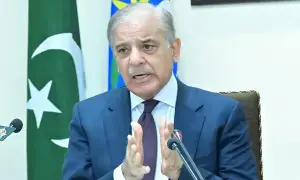If you can talk to the TTP, you can tackle missing persons: Sardar Akhtar Mengal
4 min readThe joke is that the legislation on missing persons went missing itself.
But if you ask people like Sardar Akhtar Mengal, this is just symptomatic of how the system is rigged against delivery of justice.
“As far as missing persons are concerned, it is not a new issue,” he said on Asma Shirazi’s show Faisla Aap Ka on Aaj News Wednesday night. “It was 1976, when the first case, my brother’s was the first one. But instead of a solution, we’re seeing more cases and more serious ones.”
According to Mengal, missing persons was at the top of the list of issues they had discussed with the Imran Khan government. When the current government was being formed, they brought missing persons up again. A committee was formed and is looking in the issue. “But recovery aside, more people are going missing now,” he said. And the people whose names are on the list of missing persons are being killed in fake encounters or extra-judicially.
Take the example of a young poet named Tabish, who had not picked up arms, was not in the mountains, had just recited some poetry about missing persons. He was picked up, said Mengal. “And a few months ago, when the families had held a sit-in in Quetta, a team went with the minister of interior, this boy’s name was on their list. The list with 50 names. Instead of recovering him, they sent his corpse to his family.”
Sardar Akhtar Mengal was on the show as missing persons was brought up on the floor of the National Assembly on Wednesday with important points raised by several lawmakers. Missing persons was linked to talks with the TTP, the need to enforce the National Action Plan and the need for truth and reconciliation commissions. The previous government had passed a bill on missing persons in the National Assembly but it went missing itself on the way to the Senate. The human rights minister of the day, Shireen Mazari, admitted to this much.
“All political parties agreed to the National Action Plan in which it was said that we would not negotiate with any militant organisation after today,” said Mohsin Dawar. “Ever since the Taliban government has come [in Afghanistan after the US withdrawal], the spillover has come here. Whoever brings this up, talks about the flaws in policies, points to this, find themselves being treated in the way that Ali Wazir was treated. It will not be possible without truth and reconciliation.”
The discussion deepened when Defence Minister Khawaja Asif himself spoke about the long simmering anger about missing persons. “Swat’s people have come out on the streets, the same in Balochistan,” he said. “The country, our army, intervened, politicians made mistakes. There could have been a solution. We should start with the Balochistan problem. Preferably a Supreme Court judge who is from Balochistan should be appointed [for a truth and reconciliation commission]. ToRs be decided.”
Human Rights minister Riaz Pirzada said that he was facing international criticism for Pakistan’s record. He was outspoken that the judiciary and army has not protected such people. “This haemorrhaging in Balochistan, our hearts weep for it,” he said. “What happened in Fata, we were used for another’s country’s intervention. Intolerance is by institutions, not the people. They are talking to the Taliban. They have the Taliban.”
The law on missing persons dropped off the radar on its way to the Senate. But can the current prime minister, Shehbaz Sharif, do something? Sardar Akhtar Khan Mengal was skeptical but unforgiving.
“I do not think that the government is taking this seriously,” he said. But he went on to add: “If you can talk with the Taliban, who openly killed your soldiers, who killed your former prime minister Benazir Bhutto, then surely you can tackle missing persons.”
He told Asma Shirazi that the governments give assurances that they will tackle missing persons as a matter of routine. But these assurances are not cloaked in action. It has been six months to this government. Some law or the other is being made in the assembly every day, he said. “But this important one is being ignored. We’ve pointed it out. We’ve been given assurances. Let’s see what is left between their assurances and our level of patience.”



























Comments are closed on this story.